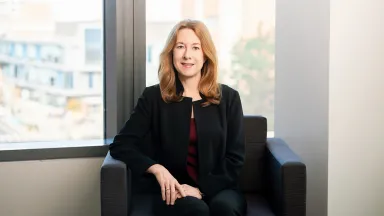
Uncovering an Overlooked Source of Information on Corporate Environmental and Social Policies
Mutual funds have become a massive component of the financial industry, with over $20 trillion in total assets within the United States during the second quarter of 2024, as measured by the Federal Reserve Bank of St. Louis. In addition to generating returns for their investors, these mutual funds are required to vote each year on various proposals of each portfolio firm.
One category of these proposals is environmental and social (ES) shareholder proposals, and in a paper recently published in the Review of Financial Studies, TD Bank Professor of Finance Michelle Lowry, PhD, along with coauthors Yazhou He of the University of Manchester and Bige Kahraman of the University of Oxford’s Said Business School, examines these mutual funds’ votes.
In “ES Proposals and Shareholder Voice,” Lowry and her co-authors look at something hidden in plain sight, shedding light on the informativeness of these frequently held – and often overlooked – votes and their implications.
As the paper shows, these proposals almost never reach the 50 percent threshold to pass, and even ones that pass aren’t binding for the companies to follow. In fact, Lowry and coauthors verify that managers do not change firm policies following these ES proposals, even when support was close to the 50% threshold rate. But the paper’s findings suggest that managers should change firm policies more often. The authors find that higher support for these ES shareholder proposals is indicative of trouble ahead for the company, including a higher rate of ES incidents and lower future firm performance.
“Our paper indicates that mutual fund managers think these proposals are important, not from a moral point of view, but from the perspective of fiduciary duty and shareholder value,” she says.
“If anyone’s saying environmental and social policies are a nice thing to have but that they don’t matter for shareholder value, I’d say that they’re wrong and that the people with money on the line say they do matter.”
While these environmental and social proposals rarely receive enough votes to pass, the rise in approval votes shows awareness that companies can increase firm value by adopting certain pro-ES policies. “Mutual funds really do invest time in evaluating these proposals, and when they vote for a policy proposal, it is for good reason,” she says. “These firms do have a lot of risk they’re susceptible to, including litigation risk.”
In the final part of the paper, Lowry and her co-authors dig into the differences in voting, across different types of mutual funds. The finding that high voting support rates on (failed) ES proposals predict subsequent ES incidents suggests that the funds voting for these proposals are informed.
However, this finding also raises the question of why more mutual funds do not vote for these proposals. To answer this question, the authors examine differences in funds’ incentive structures. The funds that vote against the proposals are more short-term oriented and they are friendlier toward management. In short, agency-related issues are a key source of friction.
One takeaway from the paper’s findings: don’t simply look at whether a shareholder proposal passed or failed. “Investors are a very informed bunch, so if a shareholder proposal got 30 percent support, you don’t have to do anything, but you probably should,” Lowry says. “70 to 30 looks like a crushing defeat, but it’s not.” This advice applies to an individual company’s management and its board, and to the major fund families like Vanguard as well.
The paper documents that support for these proposals is growing over time, as is support for shareholder proposals by Institutional Shareholder Services (ISS), the biggest proxy advisory service company. Though Lowry acknowledges debate about ISS’ accuracy, their level of support for shareholder proposals is striking: 17 percent at the start of the paper’s range of study, up to around 70 percent by the end.
The paper also provides insight into the types of ES proposals, which generally fall into one of two categories: “action” — wanting to the firm to do something, or “disclosure” — wanting the firm to provide more information on something. Findings are similar for both types of proposals. More broadly, votes on shareholder proposals are just one form of investor’s “voice,” defined in financial literature as any means an investor uses to tell the firm to act differently. While the authors focus only on shareholder proposals, funds may also pressure firms through other channels, for example through one-on-one meetings.
Lowry and her co-authors measure the ES-related risks to firms using a massive dataset called RepRisk, which culls data from newspapers, trade magazines, policy pieces and more, from around the world. The “ES incidents” measured via RepRisk can include lawsuits brought by workers, violations relating to child labor or unsafe working conditions, to name a few.
Lowry plans to build on the environmental and socially-minded aspects of this paper through further research on distinctions within the mutual fund sector, including funds specifically focused on ESG.
“These funds should care about these ES issues, so we ask: how committed are they really? Does a mutual fund family form a new ESG fund because it’s really paying attention and pressuring firms to improve their environmental and social policies in ways that increase shareholder value? Or is it just because they want to attract investors and increase cashflows?”



